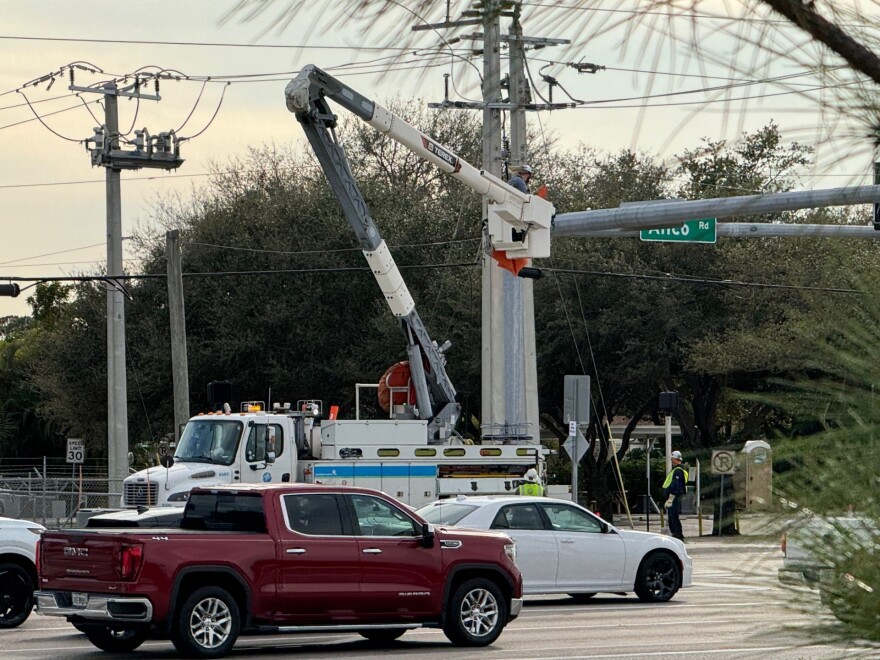TALLAHASSEE — Florida Power & Light says its proposed base-rate increases will provide stability and keep customers’ electric bills below the national average.
Opponents describe the multibillion-dollar proposal in terms such as “extravagant” and “excessive” and say it needs to be reduced.
With the state Public Service Commission scheduled next month to hold what could be a contentious hearing, the utility and representatives of consumers and businesses Friday filed documents detailing their positions on myriad issues that, ultimately, will help determine how much FPL customers pay for power over the next four years.
FPL is seeking approval from the regulatory commission for increases of $1.545 billion in 2026 and $927 million in 2027. Also, FPL would pass along costs to customers in 2028 and 2029 for solar-energy and battery-storage projects.
FPL pointed Friday in its document, known as a prehearing statement, to a need to keep up with growth while providing stability to already-existing customers. It said it expects to add 335,000 customers through 2029.
“To meet this new growth and maintain operational reliability, FPL must invest in generation, transmission and distribution,” the utility’s prehearing statement said. “Each of FPL’s new customers deserves the same outstanding reliability and low bills that existing customers have long experienced.”
But the state Office of Public Counsel, which represents consumers, and other groups taking part in the rate case said FPL is asking for too much money. The Office of Public Counsel said the request, cumulatively, would lead to customers paying $9.819 billion during the next four years over their current rates.
“In today’s tough economic climate, FPL’s customers are already under great financial pressure, and any amount of a rate increase will have a significant impact on them,” the Office of Public Counsel said in its statement. “Now, more than ever, the commission must acknowledge that unreasonable and imprudent costs are driving unfair, unjust, unreasonable and thus unaffordable bills. Over 12 million Florida residents and businesses will be directly impacted by the decisions made in this (commission) docket, and OPC (the Office of Public Counsel) is committed to ensuring that those customers pay no more than the law allows.”
Base rates make up a major part of customers’ monthly bills, along with costs such as power-plant fuel, and the commission will consider voluminous amounts of financial and other data in the FPL proposal.
As an indication of the interest in the FPL case, 14 prehearing statements were filed Friday by groups and businesses such as the Florida Retail Federation, the Florida Industrial Power Users Group, the Southern Alliance for Clean Energy, Walmart, convenience store chains, federal-government agencies and the League of United Latin American Citizens of Florida.
FPL reached a four-year rate settlement in 2021 that will expire at the end of 2025. As a result, it filed the new proposal early this year. Barring a settlement, the commission’s hearing on the FPL proposal is scheduled to start Aug. 11.
While it is not exactly clear how large of a rate increase opponents would find acceptable, the Florida Industrial Power Users Group — which regularly takes part in utility cases on behalf of large electricity users — said in its prehearing statement that the FPL proposal should be reduced to “less than 50 percent” of the request.
An example of the issues in dispute is FPL’s “return on equity,” a closely watched measure of profitability. The commission typically approves a range of allowable return on equity and a “midpoint” in the range.
FPL proposed a midpoint of 11.9 percent, in part citing a need to attract investor money.
“Fundamental to FPL’s value proposition is the maintenance of a strong credit rating and balance sheet that support the execution of its capital programs, manage its liquidity needs and provide the flexibility to respond rapidly to unexpected changes in the external environment,” the utility’s prehearing statement said.
But the Office of Public Counsel suggested the appropriate return on equity would be 9.2 percent, while the Florida Industrial Power Users Group said it shouldn’t exceed a 10.5 percent midpoint approved for Tampa Electric Co. and a 10.3 percent return on equity approved for Duke Energy Florida.




